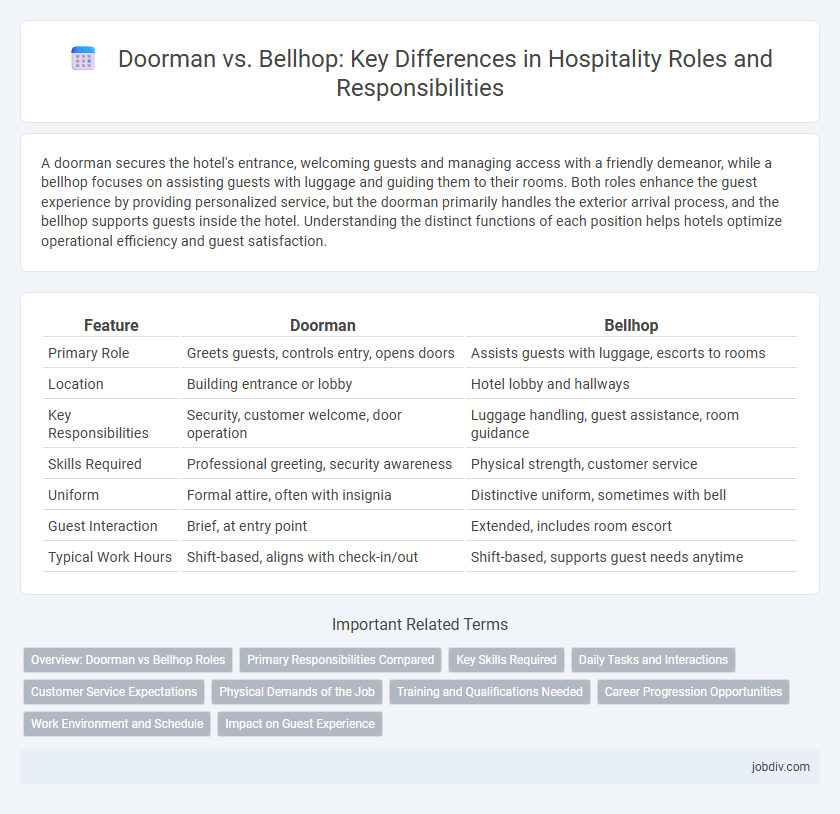A doorman secures the hotel's entrance, welcoming guests and managing access with a friendly demeanor, while a bellhop focuses on assisting guests with luggage and guiding them to their rooms. Both roles enhance the guest experience by providing personalized service, but the doorman primarily handles the exterior arrival process, and the bellhop supports guests inside the hotel. Understanding the distinct functions of each position helps hotels optimize operational efficiency and guest satisfaction.
Table of Comparison
| Feature | Doorman | Bellhop |
|---|---|---|
| Primary Role | Greets guests, controls entry, opens doors | Assists guests with luggage, escorts to rooms |
| Location | Building entrance or lobby | Hotel lobby and hallways |
| Key Responsibilities | Security, customer welcome, door operation | Luggage handling, guest assistance, room guidance |
| Skills Required | Professional greeting, security awareness | Physical strength, customer service |
| Uniform | Formal attire, often with insignia | Distinctive uniform, sometimes with bell |
| Guest Interaction | Brief, at entry point | Extended, includes room escort |
| Typical Work Hours | Shift-based, aligns with check-in/out | Shift-based, supports guest needs anytime |
Overview: Doorman vs Bellhop Roles
Doormen primarily manage building entry by greeting guests, controlling access, and assisting with luggage, enhancing security and first impressions at hotels or residences. Bellhops focus on delivering luggage, guiding guests to rooms, and providing information about hotel amenities and local attractions. Both roles contribute to guest experience but differ in responsibilities, with doormen emphasizing entrance management and bellhops specializing in personalized guest assistance.
Primary Responsibilities Compared
Doormans primarily manage the entrance of a hotel, greeting guests, handling door operations, and providing directions, ensuring a welcoming first impression. Bellhops focus on assisting guests with luggage, delivering items to rooms, and facilitating room service requests, enhancing overall guest convenience. Both roles contribute to superior guest experience but differ in direct interaction points and specific operational duties within hospitality establishments.
Key Skills Required
Doormen require exceptional customer service skills, a strong physical presence, and knowledge of security protocols to manage guest entry and ensure safety. Bellhops must excel in multitasking, possess physical stamina for luggage handling, and have keen attention to detail to assist guests efficiently with their belongings and room navigation. Both roles demand excellent communication skills and a friendly demeanor to enhance the overall guest experience in hospitality settings.
Daily Tasks and Interactions
Doormen primarily focus on greeting guests, managing building entry, and assisting with luggage outside the property, ensuring security and smooth arrivals. Bellhops handle transporting guests' luggage to rooms, providing information on hotel services, and assisting with guest requests inside the property. Both roles require strong interpersonal skills and contribute significantly to first and lasting impressions in the hospitality industry.
Customer Service Expectations
Doormen primarily enhance the first impression by greeting guests, managing doors, and providing directions, establishing a welcoming ambiance that emphasizes personalized customer service. Bellhops focus on luggage assistance, room escorting, and answering guest queries, delivering efficient and attentive service to ensure a smooth arrival experience. Both roles are essential in hospitality, with doormen setting the tone of hospitality and bellhops supporting guest comfort through hands-on assistance.
Physical Demands of the Job
Doormen require strong physical endurance to handle long hours of standing and the occasional need to open heavy doors, often in varying weather conditions. Bellhops face more intense physical demands, frequently lifting and carrying heavy luggage, sometimes weighing up to 50 pounds or more, throughout multiple trips. Both roles require stamina and strength, but bellhops typically experience a higher level of physical exertion due to constant movement and heavy lifting.
Training and Qualifications Needed
Doormen require strong customer service skills, knowledge of security protocols, and the ability to manage entry points efficiently, often trained through on-the-job experience and basic security courses. Bellhops must possess physical stamina, excellent interpersonal communication skills, and familiarity with luggage handling, typically undergoing hospitality-focused training and safety instructions. Both roles benefit from certifications in first aid and customer service, enhancing their ability to provide a seamless guest experience.
Career Progression Opportunities
Doorman and bellhop positions offer distinct career progression pathways within the hospitality industry. Doormen often advance toward security management or concierge roles, leveraging their experience in guest interaction and property access control. Bellhops typically transition into front desk management, guest services coordination, or event planning, building on their skills in guest assistance and logistical support.
Work Environment and Schedule
Doormen typically work outdoors at hotel entrances, managing arrivals and departures in all weather conditions, often during peak check-in and check-out hours, which can extend into late evenings and weekends. Bellhops operate mainly inside the hotel, assisting guests with luggage and room orientations, with schedules that align closely with guest activity patterns, including early mornings and late nights. Both roles demand flexibility, but bellhops often experience a more physically demanding environment, while doormen face exposure to varying weather conditions.
Impact on Guest Experience
Doormen enhance the guest experience by offering a welcoming presence, ensuring security, and assisting with entry, which creates a strong first impression of hospitality. Bellhops improve convenience by efficiently handling luggage and guiding guests to their rooms, helping to reduce stress and save time upon arrival. Both roles contribute to a seamless, personalized stay, reinforcing a hotel's commitment to exceptional service and guest satisfaction.
Doorman vs Bellhop Infographic

 jobdiv.com
jobdiv.com